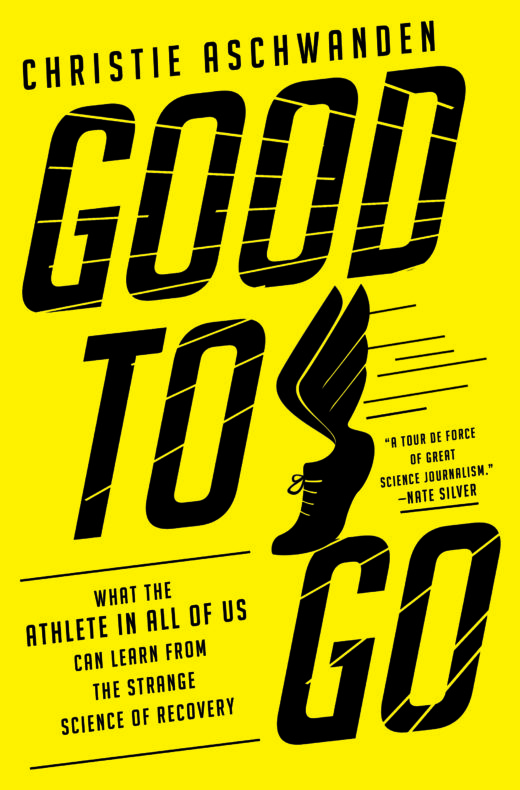Christie’s new book about recovery is out today! It’s called Good to Go: What the Athlete in All of Us Can Learn from the Strange Science of Recovery. If you are an athlete, you will love it. If you are a wannabe athlete or a science writer or a person, you will still love it because Christie says that sleeping is really great. Also, the cover is bright yellow, which just makes me happy. I asked her questions about sleep and beer and other things that also make me happy.

Cameron: Christie! You wrote a book! It’s about the science of recovery–and it’s also about beer. You’ve written about beer and running before for LWON–is that when you started thinking about writing the book?
Christie: Sort of. That beer study we did certainly got me thinking about how tricky it is to study recovery and how difficult it can be to answer even a seemingly simple question (does beer impair recovery?) with a single study. As I pondered the beer question, I came to appreciate what a difficult challenge sports scientists face.
One of the things that really stuck with me, both from the post and the book, was that there were a lot of things that affected the study results that had nothing to do with the beer– someone quit his running to exhaustion test early because his kid was waiting for him and they wanted to go home, for example. All of this made total sense to me–but also made me wonder what results we can actually trust. Are there any sure things when it comes to recovery?
Yes! Sleep. It’s the most potent recovery tool known to science. It seems really simple, but it’s something that many of us don’t properly prioritize. There’s a pretty solid body of evidence showing that sleep is crucial for recovery and getting enough of it can enhance athletic performance.
With that beer study I was also really hoping that it meant that beer made women run faster. Darn darn darn! I was so looking forward to more beer! Are there more of my favorite recovery things that don’t work as well as I would like them to?
Well, I’m not sure what your favorite things are, but I was pretty happy to find that icing is not very helpful for recovery and might even impede it. I will probably still jump into an icy cold mountain stream sometimes in the summer, but only to cool off, not in hopes of reducing soreness from a hard trail run. But I can definitely live without ice baths, which have always felt torturous to me.
I also thought the studies about hydration in the book were super-interesting. I think someone once told me you want your pee to look like lemonade or lighter to know if you’re hydrated–but that’s not really the case, is it?
I was surprised to learn that those pee color tests aren’t all that helpful, because they only tell you how much water your body is getting rid of, not how well your fluids are balanced inside. I have a whole chapter about hydration in the book, and you can read an excerpt of it at FiveThirtyEight.
What other things made you want to write this? You’re always doing fun things (skiing, running, etc.)—did you have experiences with recovery that got you interested in this?
Looking back on my athletic career, I can see that I never quite gave recovery the priority it deserves. I learned the hard way that you can only benefit from the training that you recover from. As an athlete, I was prone to overtraining. Had I focused as much attention on recovery as I’d given to training, I may have had more success.

Have you changed what you do to recover from all your fun things since you wrote this?
I give it more time. I’ve learned that you can’t rush it. I also have placed a higher priority on general stress reduction. I’ve picked up some new tools, like “floating,” which I think of as forced meditation. You lie in a small, dark tank of shallow water so salty that your body floats effortlessly. It sounds like a torture device, but I found it very relaxing and a great way to push out all the various distractions constantly vying for my attention. It’s a soothing way to fully relax mind and body.
A lot of recovery, it sounds like, is a placebo. (You and Erik are clearly onto something). I feel like a lot of things I do (stretching, foam rolling) might be making me feel better, but now I feel kind of dumb. Is it bad to be committed to your placebo recovery?
For the record, I am pro-placebo. I’m not in favor of scamming people with placebos, but I’m all for people using the power of suggestion to help themselves feel better. In the book, I talk about an NBA team that offers its players a selection of recovery tools and allows them to pick the ones they want. The players are told that these things may not have strong evidence for them, but some people find that they help. They’re essentially being told that these might be nothing more than placebos, but go ahead and see if there’s one you can believe in. Because it turns out that belief is a powerful drug.